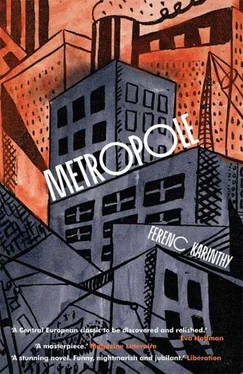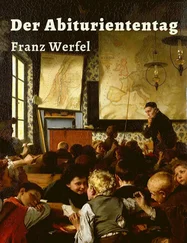He did not once see her in the lift. Was she off-duty today? Or was she working a later shift? Or was she free for the day and coming in later only to see him? Nor was there anything in box 921 downstairs, though maybe there would be in the afternoon… He set out to explore the so-far unfamiliar streets behind the hotel. He racked his brains — what kind of present he should buy: a bracelet, a necklace, some other ornament? A cigarette box, a lighter? It should, in any case, be something that she would always carry around with her.
He was surprised to discover an ice-rink not too far away. It was relatively small, a few metres below the level of the surrounding square so that one could look down on it, and indeed there were many people gathered at the rails. The rink was full of skaters, chiefly older people as it happened: the fat and the lanky, ladies of a certain age together with bald, paunchy gentlemen, gliding and turning, messing about on the ice in time to the slow music. It was strange and haunting the way they took each other’s arms, the way they were enjoying themselves, some even dancing in the dense crowd. Budai stopped to gaze. He listened to the music, mesmerised by the ebb and flow below him and by the delicately swaying old people. Soon he too began to sway to the rhythm of the slow waltz.
He realised he had missed a golden opportunity last night. Now he had both time and opportunity to communicate with somebody and to ask them to guide him to… where? To a railway station? An airport? An embassy? No matter, anywhere would do as long as it led to some familiar territory. He knew it would not have been tactful to discuss this with Etete, especially not then, recalling how she had reacted when he first began to sound her out there on the eighteenth floor, and how it was soon after that she had come into his room. Tonight though, one way or another, he had to explain it to her and overcome her objections as tenderly as he could. He simply could not delay it any further.
The really strange thing was that the person most likely to be able to help him should be the one who most tied him to the place. He felt rather confused about it in fact: did he want to leave now or did he not? He tried to think it through but was too excited and expectant. His mind was out of kilter. Maybe he should ask Dede to accompany him to the appropriate place, that being the most important thing. Having been there once, he would know the way back and then he would have more time to think and plan his departure.
Suddenly he felt anxious; maybe he misunderstood, maybe she had arrived earlier and had been looking for him. So he hurried back to the hotel, thinking he would probably be able to buy some present there at the lobby stores. First though he had to check his room which meant standing in the queue again to pick up his key.
But when he got to the desk and handed over the slip of paper with 921 on it as usual the clerk looked round then spread his palms to indicate his key was not there. And indeed his box was empty, no key was hanging on the hook. This had never happened before. Could they have hung it elsewhere by mistake? Or was the chambermaid using it to get into his room? But they had never done this before and in any case the room had already been cleaned. He had to investigate. He pushed the slip of paper back over the counter. The clerk was an elderly grey-haired man in a dark uniform who looked familiar though he had seen so many clerks here they were a little mixed up in his memory. Or could this be the man he had come across that very first time when the airport bus dropped him at the hotel? Whatever the truth, of that he treated Budai in a somewhat offhand way now, shaking his head and muttering, clearly indicating that he could not help him. When Budai persisted he brought out a large official book, leafed through it, showed him a page and pointed — fat lot of use it was him pointing like that — to something, then slammed the book shut and immediately turned to the next guest in line who had been observing Budai’s attempts while shuffling his feet and tapping his fingers with undisguised annoyance.
Understanding nothing but sensing the worst, Budai took the lift to the ninth floor, hurried down the corridors and stopped at his room. The door was shut but when he carefully put his ear to it he thought he could hear someone moving about inside. Having waited a little while, unsure what to do and unable to think of anything better, he knocked and opened the door a little. A middle-aged woman in a headscarf appeared in the gap, took a peek out then immediately closed the door behind her. He checked the room number to make sure he was in front of number 921. It seemed they had given his room to someone else. Others had moved in. So it was for them the sheets had been changed that morning.
That immediately gave him something else to worry about. What had they done with his belongings, with those minimal items of clothing he had brought with him, with that single case he had been carrying when he arrived? He knocked again but this time no one answered. Someone turned the key inside the room. He was not content to let this go but started shouting, beating the door with his fists and kicking it until they opened it again. This time a thin, blotchy-skinned man in shirtsleeves and braces appeared in the crack, glaring furiously, shouting in a high feminine voice and would have slammed the door shut again had Budai not stuck his foot there and pushed his way in.
It was the smell that hit him first, a piercing, steaming, oppressive, living smell. Then the number of people in the tiny room; besides those already mentioned, a little old woman muttering or perhaps praying in the corner, some children, four, five or even six of them — you couldn’t tell precisely in the half-light because the blinds were pulled quite far down — more people lying on the bed with a pram beside them, and others on mattresses on the floor, not to forget a child carry-basket on the table. To top things off, two cats were slipping here and there among the lot, leaping onto the windowsill, on and off chairs, on top of the wardrobe, terrifyingly large, dirty feral-looking tabbies, their shabby coats uncared for. And not only these but angora rabbits too of the kind he had seen in another room, in cages and baskets. The rabbits must have been one of the chief contributors to the combined stench. It was incredible that a hotel should tolerate this kind of thing. The room itself has been rearranged so it looked nothing like the one he had been staying in: the sofa was up against another wall, the lampshade had been removed, there was a playpen in the middle of the room, underwear was drying on the backs of the chairs. The floor was littered with personal belongings, blankets, packages, feeding bottles and chamber pots.
All the while he was observing this, the room’s new residents kept up a continuous chatter, arguing and aiming remarks at him, trying to push him out of the room. He was still looking to locate some of his personal possessions but to no avail. He could see nothing of his: no clothes, no pyjamas, not his case, nor his notes on the writing desk. He glanced into the bathroom too, but the few minor items he had brought from home had disappeared to be replaced by two clothes-lines with freshly-washed nappies and rubber pants. After that he allowed himself to be shoved outside: even the children were crying and pushing at him. He could never return here. Not that he had any desire to do so and in any case it would be embarrassing to disturb or eject a family as obviously poor and needy as this. Nor would the hotel have put them in here just so that they should throw them out again to suit Budai.
Well, yes, but where would he stay? He set out to find Epepe again in case she might be working one of the lifts but to his despair she was nowhere to be found. He returned to the ground floor, struggled through the crowded hall and stood in the queue for reception to explain his predicament, pointing to the keys and asking that he be given another room. The clerk must have been bored to death of his endless demands, having to deal with this one troublesome customer all the time and paid him little heed, looking over his shoulder to the next in line. It was pointless going on. He was simply ignored.
Читать дальше












